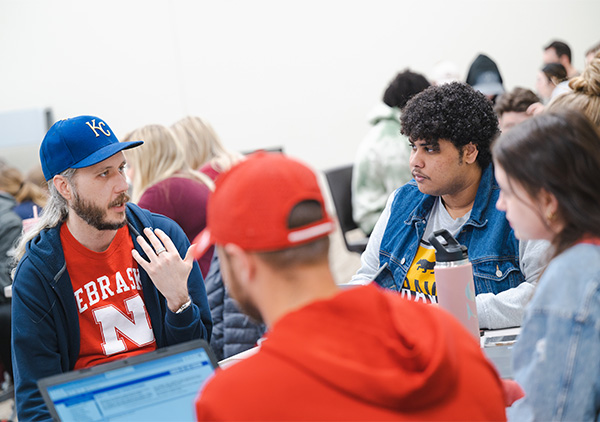Four University of Nebraska–Lincoln student teams earned a No. 1 ranking out of nearly 6,000 teams worldwide while managing a publicly traded footwear company in the Business Strategy Game (BSG) this spring. More than 267 universities used the interactive computer simulation including seniors in some sections of the College of Business capstone course called Business Strategy (MNGT 475).
“The simulation is constantly running with one round happening each week. Our class does 10 rounds and each week the teams receive a ranking. To have our student teams from Nebraska place first globally seven times this semester is amazing,” said Andrew Hanna, Assistant Professor of Management | Seacrest Teaching Fellow.
Each Monday, BSG compiles lists of the prior week’s best-performing companies worldwide based on each of four measures: overall score, earnings per share, return on average equity and stock price. From their scores and global standing, students saw how their business decisions impacted their team’s company and would adjust their strategy for the following week.
“The simulation is difficult and covers all aspects of running a business. Students must make marketing, supply chain, manufacturing, human resources, corporate social responsibility and financing decisions for their international athletic footwear company,” said Marijane England, associate professor of practice emeritus in management, who has used this simulation in teaching the business capstone course for 16 semesters. “There is not one strategy that is guaranteed to win. The outcome each week is determined by decisions made by the other teams and that impact on the industry as a whole.”
Each week provided opportunity for graduating seniors to apply everything they learned in their undergraduate business program. Kat Woerner, ’22, an economics, environmental studies, natural resource and environmental economics graduate, dug deep into the assignment, leading her team in formulating their strategy.
“I had to use almost every course I took to analyze the data and make decisions in this simulation. I also used my economics background to understand the demand of our customers in the simulation and how we could best match it for demand. Analyzing this specifically gave us a huge boost because it called attention to some weak points of the market that we could fix,” said Woerner, who is from Bellevue, Nebraska.
Hanna shared that with Woerner’s team’s early top performance, a healthy rivalry grew among his class’s simulation teams. Their competitive spirit fueled teams to perform their best.
“We wanted to have the top performance in the world. We spotted opportunities, flaws and errors, and would strategize how to get the best end result for our company,” said Mohamed Al Hussaini, ’22, supply chain management major from Muscat, Oman.
 Andrew Hanna, assistant professor of practice in management and entrepreneurship, checks in with Mohamed Al Hussaini and his teammates as they decide their next steps in the competition.
Andrew Hanna, assistant professor of practice in management and entrepreneurship, checks in with Mohamed Al Hussaini and his teammates as they decide their next steps in the competition.
Hanna noted the strongest teams made the most of the resources available to them and treated the simulation as a team sport. England said the degree of teamwork and success are entirely dependent on the make-up and abilities of the team members.
“Because of the complexity of the simulation, succeeding truly does take the ability to see the company and the industry in their entirety and make strategic decisions,” she said. “It’s fun to watch those who really ‘get it’ and set the competition on fire. It’s also rewarding to work with students who struggle and see a moment of ‘aha!’”
While students complete other major projects in this capstone business course, simulations like BSG provide an interactive way to practice strategizing with a leadership team. It also provided an eye-opening experience that fostered discussions about how business can become a greater force for good.
“Running a business has a lot more to it than I ever imagined. Even with all its components, the game still didn't include all of what it is like to serve as a top executive at a large company,” said Woerner. “Yet, it was troubling to me to be able to place first in the world with a business model that had very little investment with environmental social governance. It only really benefited the image of the company and hurt the bottom line. Our world and supply chains will be significantly impacted by climate change and resource scarcity, and students need to learn this and be encouraged to change the trajectory we are currently on in these areas.”
First Place Teams from the University of Nebraska–Lincoln in the Spring 2022 Semester
Listed by business name, number of first place rankings and team members
- Fantastic Four, two first place ranking finishes: Mohamed Al Husaini, Lucy Chapman, Devin Vetter, and Sydney Woodruff
- Hanna’s Homies, two first place ranking finishes: Hunter Bergman, Derek Oss, Keegan Shuck and Kat Woerner
- Harris Co., two first place ranking finishes: Katie Harris, Brandon Nizni and Joe Raun
- Kicks Kingdom, one first place ranking finish: Dalton Bullard, Jacob Hudec, Luke Johnson and Hans Miller
Published: June 6, 2022